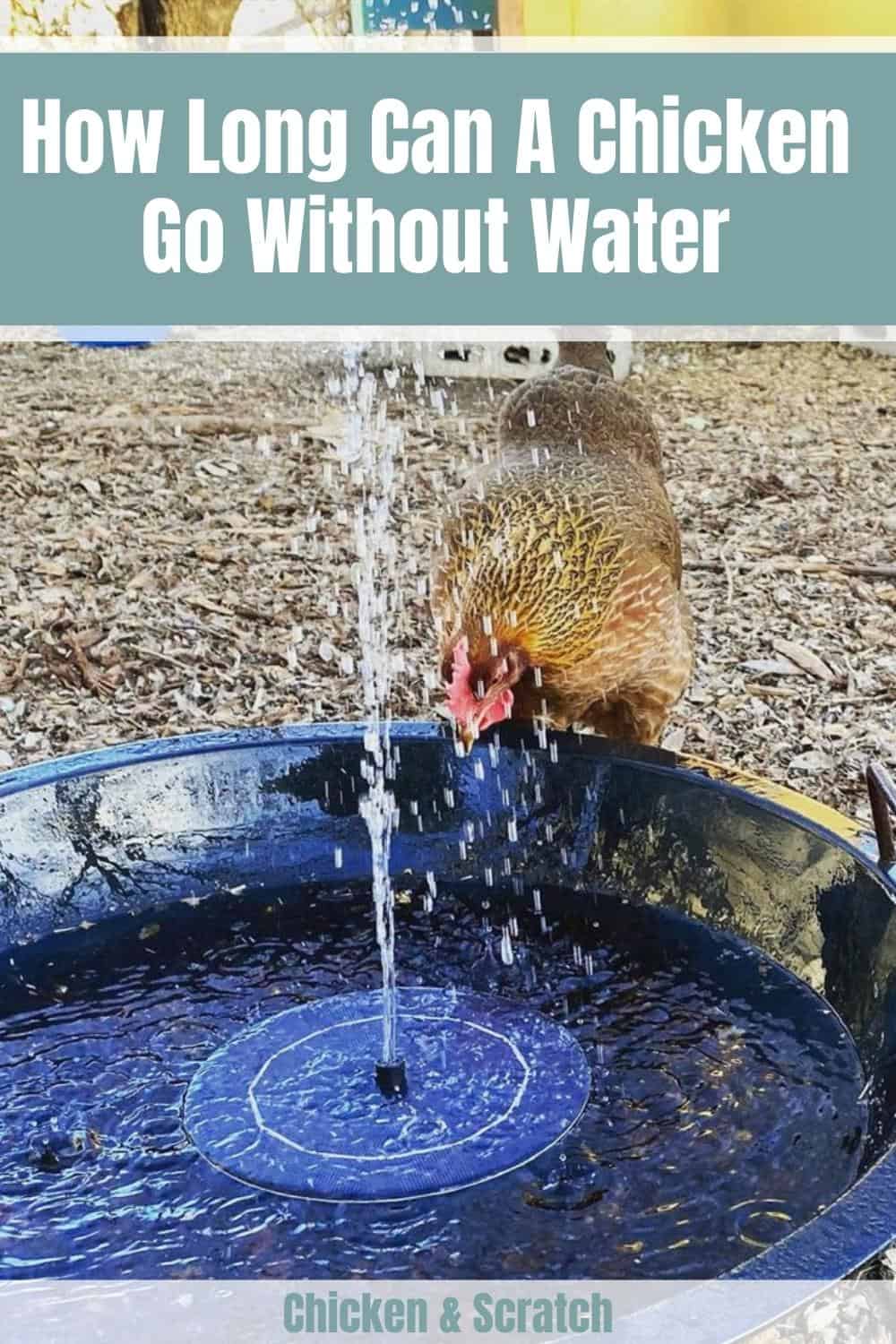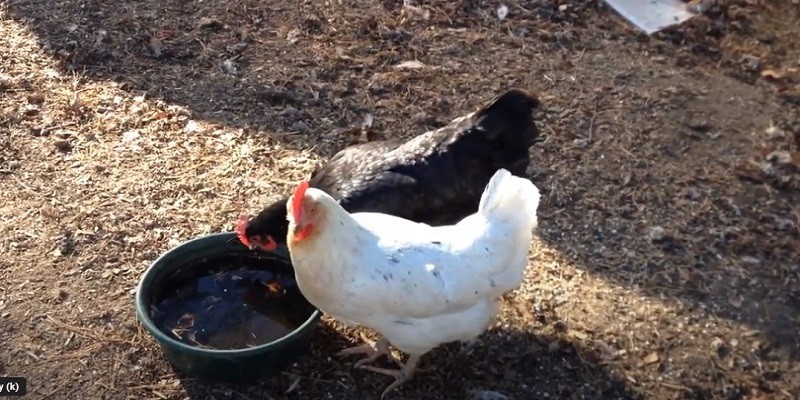A chicken can survive without water for about 48 hours. After that, dehydration can become life-threatening.
Providing a constant supply of fresh water is crucial for the health and well-being of chickens. Chickens, like all living creatures, require water to regulate their body temperature, aid in digestion, and maintain overall health. Without access to water, chickens can quickly become dehydrated, leading to a range of health issues.
Therefore, it’s essential for poultry owners to ensure that their chickens have access to clean, fresh water at all times. We will explore the importance of water for chickens, the signs of dehydration to look out for, and how to prevent water-related health problems in poultry. By the end, you’ll have a better understanding of why water is vital for chickens and how to ensure their hydration needs are met.
The Importance Of Water For Chickens
Water is a crucial element in the care of chickens. Ensuring that chickens have access to clean and fresh water is paramount for their overall health, well-being, and productivity. Let’s delve into the significant role water plays in maintaining the health of chickens.
Role Of Water In Chicken Health
Water is essential for nearly all bodily functions in chickens. It aids in digestion, nutrient absorption, and body temperature regulation. Chickens require ample water to maintain their egg production, as eggs consist of about 65% water. Additionally, water helps in the transportation of nutrients throughout the body and supports the proper functioning of vital organs, such as the liver and kidneys.
Impact Of Water Deprivation On Chickens
Depriving chickens of water can have detrimental effects on their health and overall productivity. Without an adequate supply of water, chickens can quickly become dehydrated, leading to decreased egg production, diminished growth rates, and in severe cases, mortality. Furthermore, water deprivation can compromise the chicken’s immune system, making them more susceptible to diseases and other health issues.
Signs Of Dehydration In Chickens
Dehydration in chickens can lead to serious health issues if not addressed promptly. It’s important for poultry owners to be able to identify the signs of dehydration in their flock in order to take appropriate action. Spotting these signs early can help prevent illness and maintain the well-being of chickens. Here are some visual cues and behavioral changes that indicate dehydration in chickens:
Visual Cues Of Dehydration In Chickens
When visually assessing a chicken, there are several indicators of dehydration to look out for. These can include:
- Sunken and dull eyes
- Pale or dry comb and wattles
- Reduced elasticity of the skin, leading to a wrinkled appearance
- Thickened mucous membranes in the mouth
These visual cues can provide valuable insight into a chicken’s hydration status.
Behavioral Changes Indicating Dehydration In Chickens
Monitoring the behavior of chickens is another important aspect of identifying dehydration. Some behavioral changes that may indicate dehydration include:
- Lethargy and decreased activity
- Decreased or loss of appetite
- Reduced egg production
- Increased panting or open-mouth breathing
Observing these behavioral changes can help in early detection of dehydration in chickens.
Duration Chickens Can Survive Without Water
Understanding how long chickens can survive without water is crucial for anyone raising these birds. Water is essential for their overall health, and deprivation can lead to severe consequences. Let’s delve into the factors affecting their survivability without water and the average duration they can endure without it.
Factors Affecting How Long Chickens Can Go Without Water
Several factors influence how long chickens can go without water. These include the age and size of the chickens, ambient temperature, humidity levels, and the availability of alternative sources of moisture, such as juicy fruits or vegetables. Additionally, the breed of the chicken and its overall health also play a role in determining their tolerance for water deprivation.
The average duration that chickens can survive without water varies depending on the factors mentioned above. Generally, chickens can survive for about three to four days without access to water. However, this duration may be shorter in hot and arid conditions, as heat and low humidity increase their water needs. Therefore, it is crucial to ensure that chickens always have access to clean, fresh water to maintain their health and well-being.
Emergency Measures For Dehydrated Chickens
Rehydrating Methods For Chickens
When chickens are dehydrated, it’s essential to act swiftly to rehydrate them. There are a few effective methods for rehydrating chickens:
- Provide access to fresh water: Ensure the chickens have easy access to clean, fresh water at all times. You can also consider adding electrolytes or vitamins to the water to boost hydration.
- Electrolyte supplements: Administer electrolyte supplements specifically designed for poultry to help restore balance and hydration levels.
- Watery treats: Offer watery treats such as watermelon or cucumber to encourage increased water consumption.
- Subcutaneous fluid administration: In severe cases, consult a veterinarian to administer fluids subcutaneously to rapidly rehydrate the chickens.
Preventive Measures To Avoid Dehydration In Chickens
Prevention is crucial to avoid dehydration in chickens. Implement these preventive measures to ensure optimal hydration for your flock:
- Access to clean water: Regularly check and refill waterers to ensure chickens never run out of water.
- Shade and ventilation: Provide adequate shade and ventilation to prevent overheating, which can lead to dehydration.
- Healthy diet: Feed a balanced diet with appropriate levels of moisture, and avoid high-salt treats that can increase water intake.
- Regular health checks: Monitor the health of your chickens regularly to detect and address any signs of dehydration promptly.
Long-term Consequences Of Water Deprivation
Long-term water deprivation can have severe consequences for chickens, affecting their health and overall well-being. Understanding the implications of prolonged water deprivation is crucial for ensuring the proper care and management of poultry.
Health Implications Of Prolonged Water Deprivation In Chickens
Prolonged water deprivation can lead to serious health issues in chickens, impacting their physiological functions and overall vitality.
Dehydration: Chickens deprived of water for an extended period can suffer from severe dehydration, leading to lethargy, decreased egg production, and potentially fatal health complications.
Impaired immune system: Lack of water can weaken the chickens’ immune system, making them more susceptible to diseases and infections.
Reduced egg quality: Prolonged water deprivation can negatively impact the quality of eggs produced by chickens, leading to thinner shells and decreased hatchability.
Digestive issues: Water is essential for proper digestion in chickens, and prolonged deprivation can lead to digestive disturbances and discomfort.
Ways To Rehabilitate Chickens After Water Deprivation
Reversing the effects of water deprivation in chickens requires careful rehabilitation and rehydration strategies.
Gradual reintroduction: After a period of water deprivation, it is crucial to reintroduce water gradually to prevent overconsumption and potential complications.
Electrolyte supplementation: Providing chickens with electrolyte supplements can help restore the balance of essential nutrients and support their recovery.
Monitoring and observation: Close monitoring of chickens’ behavior and health status is essential during the rehabilitation process to ensure their gradual improvement.

Credit: cs-tf.com
Ensuring Adequate Water Supply For Chickens
Water is essential for the health and well-being of chickens. It is crucial to ensure they have constant access to clean and fresh water to maintain their overall health and to support normal bodily functions. Here are some important factors to consider when providing water for your chickens:
Importance Of Maintaining Constant Access To Water For Chickens
Constant access to water is vital for chickens to stay hydrated, regulate body temperature, aid digestion, and support egg-laying productivity. Without proper hydration, chickens can suffer from dehydration, heat stress, and a decline in egg production. Additionally, limited access to water can lead to health issues and compromise the immune system of the birds. Therefore, ensuring a continuous and adequate water supply for chickens is crucial for their overall well-being.
Tips For Providing Clean And Accessible Water For Chickens
Here are some tips to help ensure that your chickens have clean and accessible water at all times:
- Clean containers: Regularly clean and sanitize water containers to prevent the growth of bacteria, algae, and other contaminants.
- Accessibility: Place water containers at an appropriate height to allow easy access for chickens without the risk of contamination. Additionally, consider providing multiple watering stations to avoid overcrowding and competition for water.
- Fresh water: Regularly monitor water levels and refill containers with fresh, clean water to prevent stagnation and ensure a constant supply for the chickens.
- Protection: Protect water containers from debris, dust, and other contaminants to maintain water quality and prevent chickens from accidentally soiling the water. Consider using covers or drip-proof mechanisms to safeguard the water source.
By implementing these tips, you can effectively provide a consistent and clean water supply for your chickens, promoting their health and well-being.
Frequently Asked Questions Of How Long Can A Chicken Go Without Water?
How Long Can A Chicken Survive Without Water?
Chickens can survive only 3 to 5 days without water before succumbing to dehydration.
What Are The Signs Of A Dehydrated Chicken?
Signs of dehydration in chickens include lethargy, reduced egg production, dry skin, and sunken eyes.
How Can I Prevent Dehydration In My Chickens?
Provide clean, fresh water at all times and ensure water containers are kept in shaded areas to prevent evaporation.
Can Chickens Drink From Sources Other Than Water Containers?
Yes, chickens can drink from puddles, but these sources may contain harmful bacteria, so it’s best to provide clean water.
What Can I Do If My Chicken Refuses To Drink Water?
Try adding a small amount of apple cider vinegar or electrolytes to the water to entice the chicken to drink.
Are There Any Health Risks Associated With Chicken Dehydration?
Dehydration can lead to organ failure, reduced egg production, and even death in severe cases, so it’s crucial to ensure chickens have access to water at all times.
Conclusion
Understanding the importance of water for chickens is crucial. By regularly providing sufficient water, you can ensure the well-being and health of your flock. With a clear understanding of their water requirements, you can establish a routine that supports their vitality and longevity.
Keep your chickens hydrated for their overall wellness.
Last Updated on April 23, 2025 by Pauline G. Carter

